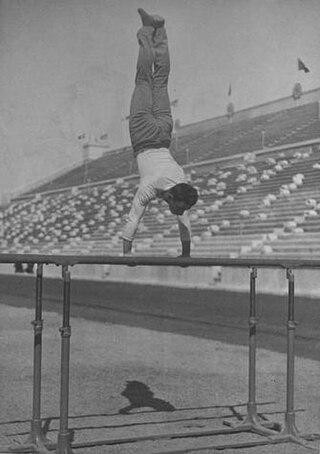
The men's parallel bars was one of eight gymnastics events on the Gymnastics at the 1896 Summer Olympics programme. The parallel bars event was held on 10 April, the seventh gymnastics event to be held. 18 gymnasts from six nations competed, with the judges announcing Alfred Flatow as the winner and Louis Zutter as the runner-up.

The men's horizontal bar was one of eight gymnastics events on the Gymnastics at the 1896 Summer Olympics programme. It was held on 9 April, as the sixth gymnastics event. 15 athletes from four nations entered the competition. Two winners were announced, with Hermann Weingärtner winning his first individual gold medal, which was added to his two team gold medals and his three other individual medals. His countryman, Alfred Flatow, won his first individual medal.

The men's vault was one of the eight gymnastics events on the Gymnastics at the 1896 Summer Olympics programme. The third event, it was held on 9 April. 15 athletes from five nations competed. The Germans captured the gold and bronze medals, while Zutter won the silver for Switzerland.

The men's pommel horse was one of eight gymnastics events on the Gymnastics at the 1896 Summer Olympics programme. The pommel horse was the fourth event held on 9 April. 15 athletes from five nations started the pommel horse exercise. Zutter won Switzerland's first gold medal in this event, with Weingärtner taking the silver.
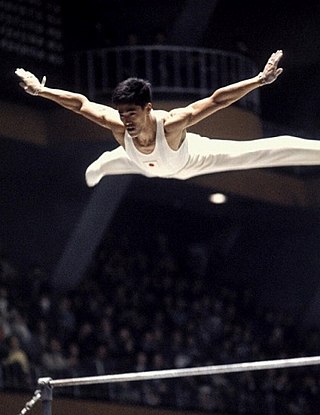
The men's parallel bars was a gymnastics event contested as part of the Gymnastics at the 1964 Summer Olympics programme at the Tokyo Metropolitan Gymnasium. The event was held on 18, 20, and 23 October. There were 128 competitors from 29 nations, with nations in the team competition having up to 6 gymnasts and other nations entering up to 3 gymnasts. The event was won by Yukio Endo of Japan, the nation's first victory in the parallel bars after two Games with silver and bronze medals. It was the first of a four-Games gold medal streak for Japanese gymnasts in the event. Japan also took silver, with Shuji Tsurumi finishing second. Bronze went to Franco Menichelli of Italy.

The men's horizontal bar was a gymnastics event contested as part of the Gymnastics at the 1964 Summer Olympics programme at the Tokyo Metropolitan Gymnasium. The event was held on 18, 20, and 23 October. There were 128 competitors from 29 nations, with nations in the team competition having up to 6 gymnasts and other nations entering up to 3 gymnasts. The event was won by Boris Shakhlin of the Soviet Union, the nation's first victory in the horizontal bar after two Games with silver and bronze medals. The Soviets also took silver, with Yuri Titov finishing second. Shakhlin and Titov were the fifth and sixth men to win multiple medals in the horizontal bar. Bronze went to Miroslav Cerar of Yugoslavia.

The men's horizontal bar competition was one of eight events for male competitors of the artistic gymnastics discipline contested in the gymnastics at the 2004 Summer Olympics in Athens. The qualification and final rounds took place on August 14 and August 23 at the Olympic Indoor Hall. There were 79 competitors from 29 nations, with nations competing in the team event having up to 5 gymnasts and other nations having up to 2 gymnasts. The event was won by Igor Cassina of Italy, the nation's first victory in the horizontal bar and first medal of any color in the event since 1928. Paul Hamm took silver, the United States' first horizontal bar medal since 1992. Bronze went to Isao Yoneda of Japan, the once-dominant nation's first medal in the event since 1984.

The men's parallel bars competition was one of eight events for male competitors of the artistic gymnastics discipline contested in the gymnastics at the 2004 Summer Olympics in Athens. The qualification and final rounds took place on August 14 and August 23 at the Olympic Indoor Hall. There were 81 competitors from 31 nations, with nations competing in the team event having up to 5 gymnasts and other nations having up to 2 gymnasts. The event was won by Valeriy Honcharov of Ukraine, the nation's second victory in the parallel bars. Hiroyuki Tomita took silver, putting Japan above the Soviet Union on the all-time medal table for the event. Li Xiaopeng of China became the seventh man to win multiple parallel bars medals with his bronze adding to his 2000 gold.

The men's rings competition was one of eight events for male competitors of the artistic gymnastics discipline contested in the gymnastics at the 2004 Summer Olympics in Athens. The qualification and final rounds took place on August 14 and August 22 at the O.A.C.A. Olympic Indoor Hall. There were 77 competitors from 28 nations, with nations competing in the team event having up to 5 gymnasts and other nations having up to 2 gymnasts. The event was won by Dimosthenis Tampakos of Greece, the nation's first victory in the rings since 1896 and second overall. Yordan Yovchev of Bulgaria took silver, while Jury Chechi of Italy earned bronze. All three men had previously won a medal in the event; they were the 9th, 10th, and 11th men to win multiple rings medals.

The men's rings competition was one of eight events for male competitors in artistic gymnastics at the 2000 Summer Olympics in Sydney. The qualification and final rounds took place on September 16 and 24 at the Sydney Super Dome. There were 78 competitors from 29 nations; nations competing in the team event could have up to 5 gymnasts in the vault, while other nations could have up to 2 gymnasts. The event was won by Szilveszter Csollány of Hungary, the nation's first victory in the rings. Csollány, who had taken silver in 1996, became the eighth man to win multiple medals in the event. The silver this time went to Dimosthenis Tampakos of Greece—the first medal in the event for a Greek gymnast since 1896. Yordan Yovchev earned Bulgaria's first rings medal since 1960 with his bronze.

The men's rings competition was one of eight events for male competitors in artistic gymnastics at the 1996 Summer Olympics in Atlanta. The qualification and final rounds took place on July 20, 22 and 28th at the Georgia Dome. There were 102 competitors from 31 nations, with nations in the team event having up to 7 gymnasts and other nations having up to 3 gymnasts. The event was won by Jury Chechi of Italy, the nation's first victory in the men's rings since 1924 and first medal in the event since 1964. There was a tie for silver, between Szilveszter Csollány of Hungary and Dan Burincă of Romania. It was the best result so far for either nation; Romania had previously had a bronze medalist but this was Hungary's first trip to the podium in the rings.

The men's horizontal bar competition was one of eight events for male competitors in artistic gymnastics at the 1996 Summer Olympics in Atlanta. The qualification and final rounds took place on July 20, 22 and 28th at the Georgia Dome. There were 105 competitors from 31 nations, with nations in the team event having up to 7 gymnasts and other nations having up to 3 gymnasts. The event was won by Andreas Wecker of Germany, the nation's first victory in the men's horizontal bar since 1896. Wecker, who had won silver four years earlier, was the ninth man to win multiple medals in the event. Silver in 1996 went to Krasimir Dunev, Bulgaria's first horizontal bar medalist since 1980. There was a three-way tie for bronze: Russia and Belarus earned medals in their first independent appearances with Alexei Nemov and Vitaly Scherbo, respectively, while Fan Bin earned China's first medal in the event since 1984.
The men's parallel bars competition was one of eight events for male competitors in artistic gymnastics at the 1992 Summer Olympics in Barcelona. The qualification and final rounds took place July 27, 29 and August 2 at the Palau dels Esports de Barcelona. There were 93 competitors from 25 nations, with nations in the team event having 6 gymnasts while other nations could have up to 3 gymnasts. The event was won by Vitaly Scherbo of the Unified Team, the third time in four Games that a Soviet or former Soviet gymnast won the rings. Li Jing of China earned silver. There was a three-way tie for third, with Igor Korobchinski of the Unified Team, Guo Linyao of China, and Masayuki Matsunaga of Japan each receiving bronze medals. They were the first medals for China in the parallel bars.
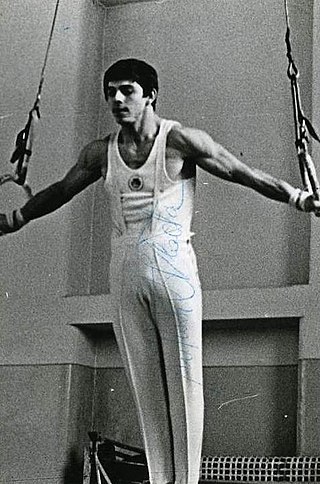
The men's rings competition was one of eight events for male competitors in artistic gymnastics at the 1976 Summer Olympics in Montreal. The qualification and final rounds took place on July 18, 20, and 23rd at the Montreal Forum. There were 90 competitors from 20 nations, with nations competing in the team event having 6 gymnasts while other nations could have up to 3 gymnasts. The event was won by Nikolai Andrianov of the Soviet Union, the nation's first victory in the rings since 1960. Another Soviet gymnast, Alexander Dityatin, took silver. The Soviet podium streak in the event reached seven Games. Dan Grecu earned Romania's first medal in the rings. Japan's three-Games gold medal streak and five-Games podium streak in the event ended as the nation's best results were fifth and sixth places.
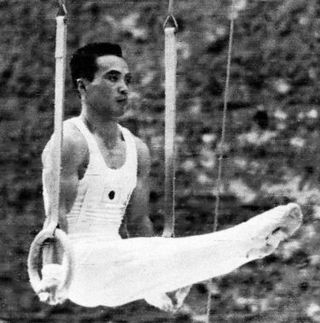
The men's rings competition was one of eight events for male competitors in artistic gymnastics at the 1960 Summer Olympics in Rome. It was held on 5, 7, and 10 September at the Baths of Caracalla. There were 129 competitors from 28 nations, with nations in the team competition having up to 6 gymnasts and other nations entering up to 2 gymnasts. The event was won by Albert Azaryan of the Soviet Union, the first man to successfully defend an Olympic title in the rings. Boris Shakhlin took silver, making it the third consecutive Games the Soviets finished in the top two. Takashi Ono tied with Velik Kapsazov for bronze, giving Japan its second consecutive Games with at least one bronze medal and Bulgaria its first medal in the rings.

The men's rings competition at the 2016 Summer Olympics was held at the HSBC Arena on 6 and 15 August. There were 70 competitors from 34 nations. The event was won by Eleftherios Petrounias of Greece, the nation's first medal in the men's rings since 2004. Defending champion Arthur Zanetti of Brazil finished second, making him the 13th man to win multiple medals in the event. Denis Ablyazin earned Russia's first post-Soviet medal in the event with his bronze.
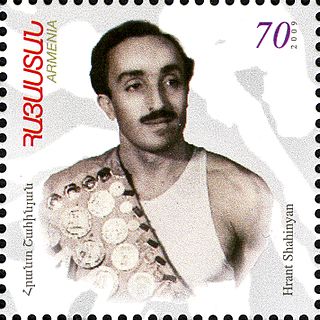
The men's rings competition at the 1952 Summer Olympics was held at Töölö Sports Hall, Exhibition Hall I from 19 to 21 July. It was the eighth appearance of the event. There were 185 competitors from 29 nations, with each nation sending up to 8 gymnasts. The Soviet Union, in its debut in the event, won a medal of every color but did not quite sweep the medals as there was a tie for third. Hrant Shahinyan was the winner, Viktor Chukarin took silver, and Dmytro Leonkin shared bronze with Hans Eugster of Switzerland.
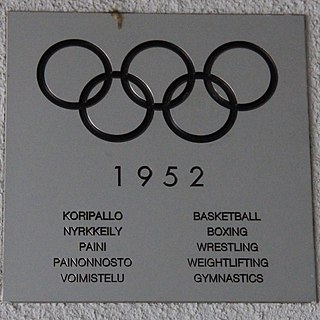
The men's pommel horse competition at the 1952 Summer Olympics was held at Töölö Sports Hall, Exhibition Hall I from 19 to 21 July. It was the eighth appearance of the event. There were 185 competitors from 29 nations, with each nation sending up to 8 gymnasts. The event was won by Viktor Chukarin as the Soviet Union swept the medals in its debut. It was the fourth medal sweep in the event, and last before apparatus finals with a two-gymnast-per-nation limit made further sweeps impossible. Yevgeny Korolkov and Hrant Shahinyan tied for silver.

The men's parallel bars competition at the 1952 Summer Olympics was held at Messuhalli, Exhibition Hall I from 19 to 21 July. It was the eighth appearance of the event. There were 185 competitors from 29 nations, with each nation sending up to 8 gymnasts. The event was won by Hans Eugster of Switzerland, the nation's second consecutive and third overall victory in the parallel bars, breaking a tie with Germany for most all-time. Switzerland also took bronze, as Josef Stalder repeated his 1948 third-place performance. The Soviet Union's debut resulted in a silver medal for Viktor Chukarin, who would become the third multi-medalist in 1956.
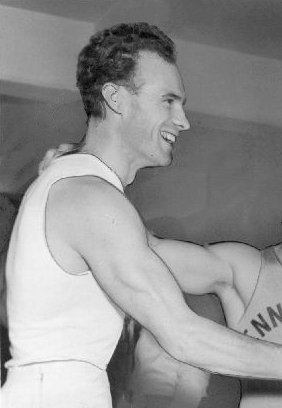
The men's horizontal bar competition at the 1952 Summer Olympics was held at Töölö Sports Hall, Exhibition Hall I from 19 to 21 July. It was the eighth appearance of the event. There were 185 competitors from 29 nations, with each nation sending up to 8 gymnasts. The event was won by Jack Günthard of Switzerland, the nation's second consecutive and third overall victory in the horizontal bar, breaking a tie with the United States for most all-time. Switzerland also took one of the silver medals, as Josef Stalder tied with Alfred Schwarzmann of Germany, competing at the age of 40, for second. Stalder and Schwarzmann were the first two men to win multiple horizontal bars medals; Stalder had won the event in 1948 and Schwarzmann had earned bronze in 1936.



















